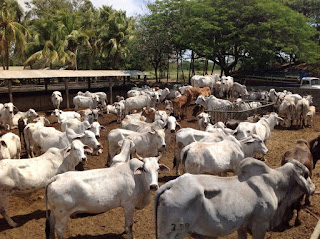Seeking Shade: Bull Health in Nicaragua
 |
| Herds with little access to shade |
The purpose of Katie Pfieffer and Heather Schlesser’s visit was to provide trainings on male cattle reproduction, especially the factors that affect male reproduction. The goal was to try and determine what is affecting reproduction of bulls in Nicaragua and what if anything can be done to increase the reproductive performance of these bulls.
 |
| Schlesser presenting at Le Leche conference |
“Upon arriving to Nicaragua we met with Farmer-to-Farmer staff to discuss the weeks ahead. The first activity that we participated in was the Le Leche conference for dairy producers in Nicaragua. At this event there were 300 total people, 60 of them female, and 240 of them male. At this conference I (Schlesser) presented on heat stress and its effects to reproduction. At the end of the presentation I also fielded questions on how deforestation can affect heat stress and how to decrease heat stress. The climate of Nicaragua places animals in moderate to mild levels of heat stress year round. Strategies to reduce the heat stress placed on animals are necessary not only for the reproductive performance of the animals but for also the animals ability to grow and maintain health. Farmers practice deforestation of their land to increase the grazing land available for their cattle. However, by doing so they increase the level of heat stress the animals are experiencing.
 |
| All of the participants |
In addition to the education and assistance that Farmer-to-Farmer volunteers provide the host organizations, volunteers consistently report on the richness of their own learning experiences working with their hosts.
 |
| Old tires recycled to make feeding bins |
Ms. Schlesser said, "This trip allowed me not only to see how other cultures practice farming but also to learn about a different culture. During the last two weeks I have had the opportunity to interact with the most selfless and welcoming people I have ever met. The veterinarians and technicians were thoroughly interested in the topic and asked thought-provoking questions. For me it was enjoyable to work with people that wanted to learn and make a difference. I intend to use the presentations prepared for this trip with my farmers in Wisconsin. While visiting some of the farms I noticed some alternative feeding structures, which I think would work well on some of the farms in Wisconsin. The use of old tires is a great way to use items that are already found around the farm."
Ms Pfieffer added, "This trip was a once in a lifetime opportunity to experience cattle production in Central America. I had previously traveled to Costa Rica on vacation but that was a very different type of experience. Meeting the local people and experiencing the food and culture was unique. I really enjoyed working the veterinarians and veterinary technicians. Professionally, I provided a lot of information. This increased my understanding of some topics and also helped me continue to develop my presentation skills."

.png)

Comments
Post a Comment